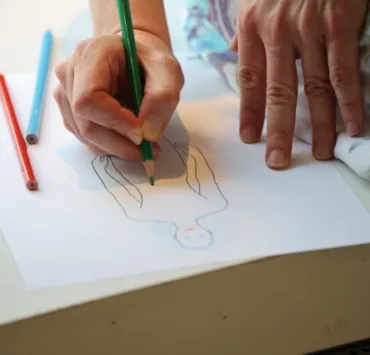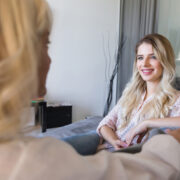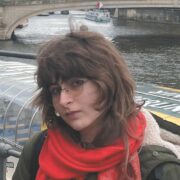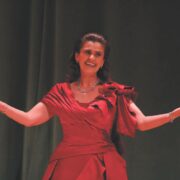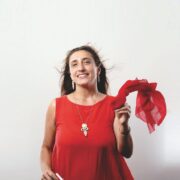Pentru vindecare, nimic nu este mai important decât calitatea prezenței terapeutului
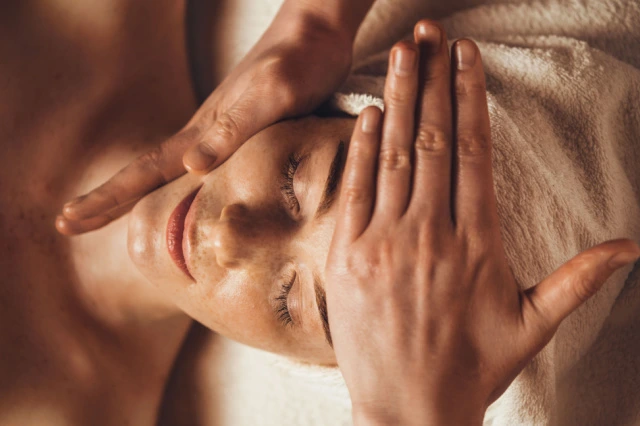
Am stat de vorbă cu Liane Pinto, născută în Brazilia, de 32 de ani psihoterapeut, ca prefață la workshop-ul pe care îl va ține la București pe 8 și 9 iulie, în calitate de trainer în cadrul Somatic Experiencing International.
Psychologies: Cum ai descoperit că poți fi vindecător?
Liane Pinto: La 7-8 ani am decis că vreau să devin medic. Pe la 9 ani citeam deja niște cărți pe care le aveam în casă, despre fiziologie, boli etc. La 11-12 ani am cunoscut – femeie-psiholog: am observat cum lucrează cu mintea, cu comportamentul și cum ajută oamenii – atunci am început să mă gândesc că o să fac școala de medicină și o să mă fac psihiatru sau neurolog sau poate voi face psihologie. Am dat examene atât la Facultatea de Medicină, cât și la Facultatea de Psihologie. Dar s-a întâmplat să nu văd rezultatele de la medicină, așa că am pierdut intervalul de timp pentru a mă înregistra acolo și am rămas cu psihologia. Când eram copil doream să ajut oamenii în procesul de vindecare, dar nu știam cum – când am început să lucrez ca psiholog am văzut foarte multe rezultate de la început (lucram cu copiii) și nu am știut practic cum. Mulți m-au întrebat: ce faci cu acești copii? Am mărturisit că nu aveam nicio tehnică, dar îi iubesc. Era doar un mod de a-mi arăta grija, de a fi empatică, de a fi alături de ei cu întreaga prezență. După mai mulți ani de lucru cu procesul de vindecare în calitate de psiholog clinician, cei pe care îi ajutam îmi spuneau că vocea mea e vindecătoare, că privirea mea le este de foarte mare ajutor, că prezența mea însăși îi face să se simtă mai bine – și atunci au zis că sunt născută să fiu vindecătoare, că sunt vindecătoare prin natura mea.
Ce ai studiat și cum te-ai format?
L. P.: Am terminat Facultatea de Psihologie – am studiat și câteva discipline de la Facultatea de Medicină – introducere în neurologie, fiziopatologie neurologică, la Institutul de Psihiatrie am studiat psihopatologia, am făcut un curs postuniversitare de psihopedagogie și apoi un master în sănătate publică. Mereu am studiat câte ceva: am studiat și medicina antroposofică, NLP, coaching, psihodrama, biosinteză, bioenergetică, psihologie somatică integrativă. Am început să studiez și analiza jungiană și desigur somatic experiencing – aceasta a fost cea mai bună pentru mine. Eram profesoară de NLP și apoi am început să fiu profesoară de Somatic Experiencing. Dar, din toate lucrurile pe care le-am învățat am realizat că cel mai important lucru este prezența terapeutului, calitatea prezenței sale, felul în care se conectează cu clientul, intenția și dorința lui de a ajuta. Acestea sunt mai importante decât tehnica și abordarea.
Citește continuarea articolului în ediția de iunie 2023 a revistei Psychologies sau abonează-te și profită de ofertele speciale!
English version
Interview with Liane Pinto, a psychotherapist with 32 years of experience, born in Brazil, 32-year-old psychotherapist. She will be in Bucharest for a workshop, July 8 and 9, as a @Somatic Experiencing International trainer
How did you discover that you could be a healer?
Liane Pinto: At 7-8 years old I decided that I wanted to become a doctor. Around the age of 9, I was already reading some books I had at home, about physiology, diseases, etc. When I was 11 or 12 I met a psychologist: I noticed how she works with the mind, with behavior and how she helps people – then I started to think that I will do medical school and become a psychiatrist or a neurologist or maybe I do psychology I took exams both at the Faculty of Medicine and at the Faculty of Psychology. But I happened not to see the results from medicine school, so I missed the time slot to register there and I got stuck with psychology. When I started working as a psychologist I saw a lot of results from the beginning (I was working with children) and I didn’t really know how. Many have asked me: what do you do with these children? I confessed that I had no technique, but I love them. It was just a way to show my care, to be empathetic, to be with them with all my presence. After many years of working with the healing process as a clinical psychologist, the people I helped told me that my voice had healing power, that my look was very helpful, that my very presence made them feel better – and then they said that I was born to be a healer, that I am a healer by nature.
What did you study and how did you get your education?
L. P.: I got a licence in psychology – I also studied several subjects from the Faculty of Medicine – introduction to neurology, neurological physiopathology, at the Institute of Psychiatry I studied psychopathology, I did a postgraduate course in psychopedagogy and then a master’s in public health. I have always studied something: I also studied anthroposophic medicine, NPL, coaching, psychodrama, biosynthesis, bioenergetics, integrative somatic psychology. I also started studying Jungian analysis and of course somatic experiencing – this was the best for me. I was a teacher of NLP and then I started to be a teacher of Somatic Experiencing.
I realised that the most important thing is the presence of the therapist, the quality of his presence, the way he connects with the client, his intention and desire to help. These are more important than technique and approach.
What made you turn to the study of trauma?
L. P.: I didn’t intend to work directly with trauma. Indirectly, we work with trauma when we do clinical psychology, even if we don’t know it. I was lecturing on stress and quality of life and I ended up in a bank where I was recommended to do a program for victims of bank robberies or kidnappings. That’s how I started organising this program – and when there was an attack in a branch they called me to do a group therapy session for the employees there. The first experience was not so good because we had strict working conditions – only 2 hours before the opening of the bank and employees were required to attend. I left with the feeling that I should do something different – so the next time I settled for my own conditions: the bank will only pay me for 2 hours, but I will stay with the people for as long as it takes for them. It was 6 hours overall – 2 hours with the branch manager who suffered the kidnapping and the rest with the other employees. Then the employees wrote to the general manager, saying how good they felt and that they were grateful. Then the bank gave me the freedom to reorganise the project exactly as I wanted. So I started working long hours. For years I did just that – for banks or other organisations. Then a colleague told me that if I work with trauma I should study: somatic experience. This is the approach I now use the most and teach.
You come from another continent, from another culture, and I would like to ask you if in your culture the relationship of man with the body is as unfriendly as it is in our culture?
L. P.: There are differences between cultures: some pay more attention to the body than in Europe. But in the whole world, if a person is traumatised, the process of dissociation from the body will take place, regardless of the culture from which it comes.
It has already become commonplace to say that trauma closes in the body, constricts it, affects it to the point of wounding and destruction, or, at other times, conversely, affects it by losing all sensitivity. Is this relationship of trauma to the body the same everywhere, in everyone?
L. P.: Somatic Experience created by Peter Levine is an approach that is widespread all over the world, the idea of what trauma is is so widespread today that I would say that many people all over the world understand that the body is affected by trauma.
Will the relationship with the body that we learn in childhood, adolescence, throughout our entire formation in our culture, also determine the way our body can process trauma?
L. P.: Yes. If in our culture we will learn to pay attention to sensations, to listen to our body and its needs, to respect our limits, this learning can help us to have a better experience of ourselves in our body, even after we go through potentially traumatic.
At the limit, if we were more tolerant and permissive with our bodies, if we knew them better and let them express themselves better, could we have a better ability to process psychic experiences, even traumas?
L. P.: Yes, this also refers to psychic and physical experiences. Peter Levine, creator of the Somatic Experiencing method, studied ethology and observed that wild animals go through various life-threatening experiences in their natural habitat, but they are not traumatised and we all as human beings have an innate, incredible capacity to relieve stress. We can self-regulate. The problem is that our society, our cultures, greatly suppress social manifestations and teach us not to direct our attention to the sensations and manifestations of the body.
Can our relationship with pleasure be a good predictor of our relationship with pain?
L. P.: Peter Levine says that the ability to experience our body in moments of pleasure can also help us tolerate pain better. Resilience created by past experiences and belief systems allows us to tolerate pain – more or less.
What is Somatic personal experience for you?
L. P.: It has become the best tool through which I can carry out my life’s mission – the mission of helping people and helping organisations in their transformation and development processes.
What do you primarily teach your students?
L. P.: The language full of empathy and love that allows us to better welcome and accompany a person who is in a stressful situation. Which includes acceptance, compassion, quality time together, ie being present in our relationship with them.
You have followed generations of disciples, you have had diverse patients: have you noticed big differences between the way men relate to their bodies, compared to women in our time?
L. P.: Sadly yes. We cannot tell how much of this situation is a consequence of our biological programming and how much is due to societal influences. Family culture and previous experiences greatly interfere with the relationship with the body. I have met yoga teachers who have an extraordinary capacity for interoception, for the deep perception of one’s own body. And I’ve met women addicted to their bodies mainly because of trauma.
What do our bodies and souls lack most in this age?
L. P.: We lack time to listen to each other, to understand each other, to take care of ourselves. We need to connect with our own nature, Mother Earth and the other beings with whom we share this vast habitat that is our planet.
Roxana Melnicu este redactor-șef al revistei Psychologies. Psiholog din 1997, jurnalist din 2000, Roxana a tradus numeroase lucrări din câmpul psihologic, iar obiectivul ei este ambițios: construirea unei culturi psihologice care să fie activă pe o pe scară cât mai largă în societatea românească.


